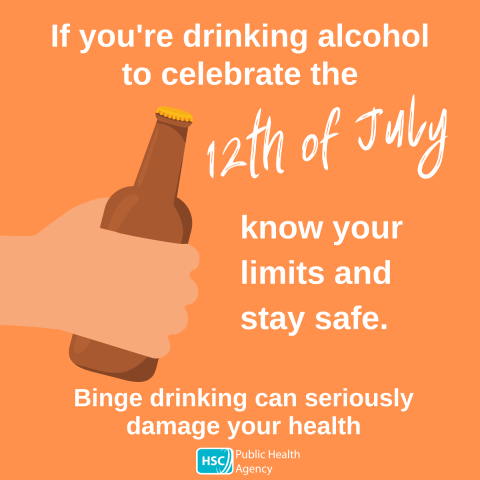Don’t let alcohol ruin your Twelfth of July

Many people will be getting ready to mark the Twelfth of July and the Public Health Agency (PHA) is urging anyone choosing to use alcohol throughout the celebrations to keep an eye on their drinking by making a sensible plan and sticking to it.
Whether it is drinking at home, at a party, at an eleventh night bonfire, or at a parade, everyone is being reminded that alcohol carries serious risks both to safety and to health.
Kevin Bailey, the PHA’s Regional Lead for Drugs and Alcohol said: “We understand that the Twelfth is a time to relax and let off some steam but we’d encourage people to do so safely by keeping an eye on what and how much they’re drinking.
“It is easy to forget that alcohol is a powerful drug. We need to be careful how we use it, and be aware of the effect it can have on our health and the negative impact on those around us. Many people might use alcohol to relax, but instead of helping us to cope, excess amounts can have both an immediate and long-term negative impact on our lives.
“By setting a plan, you can avoid binge drinking which has been shown to have adverse effects on our health and safety.
“Binge drinking, which can be as little as just a few drinks, can have a major impact on health such as causing damage to the liver, heart, brain and stomach. Over-indulging in alcohol can also affect relationships and spoil the celebrations for you, your family and friends.
“Drinking too much can also mean more risk-taking behaviour, which may cause accidents, impacting on an already under pressure health service. So please think before you drink.”
It is recommended that men and women drink no more than 14 units per week, to keep health risks from alcohol to a low level. If you do drink as much as 14 units per week, it is best to spread this evenly over three or more days – and avoid ‘saving up’ your units for a particular day or a party.
14 units are about the same as five pints of 5% strength beer, so you can see how the units can add up and you can quickly reach your limit.
Kevin added: “A lot of people will be meeting up with family and friends during the celebrations and it’s worth remembering that seeing adults drinking and drunk can be frightening for children and young people. Make sure there is at least one non-drinking adult in the house at all times and if you are drinking try to leave it late until the kids have gone to bed.
“It is very important that we remind people about the dangers of co-sleeping, particularly if sleeping on a sofa or armchair. Don’t allow your baby to share a bed with anyone who has been smoking, drinking alcohol or taking drugs (including medication). The risk of sudden infant death occurring increases when bed-sharing if you or your partner have drunk alcohol, smoked or taken drugs that make you drowsy.
“Remember, you don’t need alcohol to have a good time, but if you do decide to drink, know your limits.
“It can be difficult when you feel under pressure in a group to have ‘just one more’ but keep an eye on what you’re drinking, let others know that you’re sticking to it and that can help.”
There is a handy ‘virtual bar’ app on www.DrugsAndAlcoholNI.info which can help you understand alcohol units and keep track of your intake.
If you do decide to drink alcohol over the over the Twelfth celebrations, try to follow these simple tips:
- Don’t mix alcohol and any other drugs – the mix can be toxic and cause serious damage to your health and even death;
- Always look after yourself and know what your limits are;
- Have something to eat before you start drinking to slow down the absorption of alcohol;
- Alternate each alcoholic drink with a non-alcoholic drink; for example, water or a soft drink;
- Take frequent breaks from drinking to give your body time to recover;
- Don’t let anyone pressure you in to drinking more than you want to;
- Keep track of your drinks and don’t let anyone top up your drink until it’s finished;
- If a friend does drink too much, don't leave them alone or let them wander off, encourage them to re-hydrate with non-alcoholic drinks and get them home safely.
If you think you might have a problem with alcohol and/ or drugs and would like to get help please visit www.DrugsAndAlcoholNI.info for information on support services near you.
There is also a range of services available to you if you are affected by someone else’s drinking and/or drug misuse, information on these services are also available on this website. These services are available to you regardless of whether or not your loved one is receiving help for his or her alcohol and/ or drug problem.
